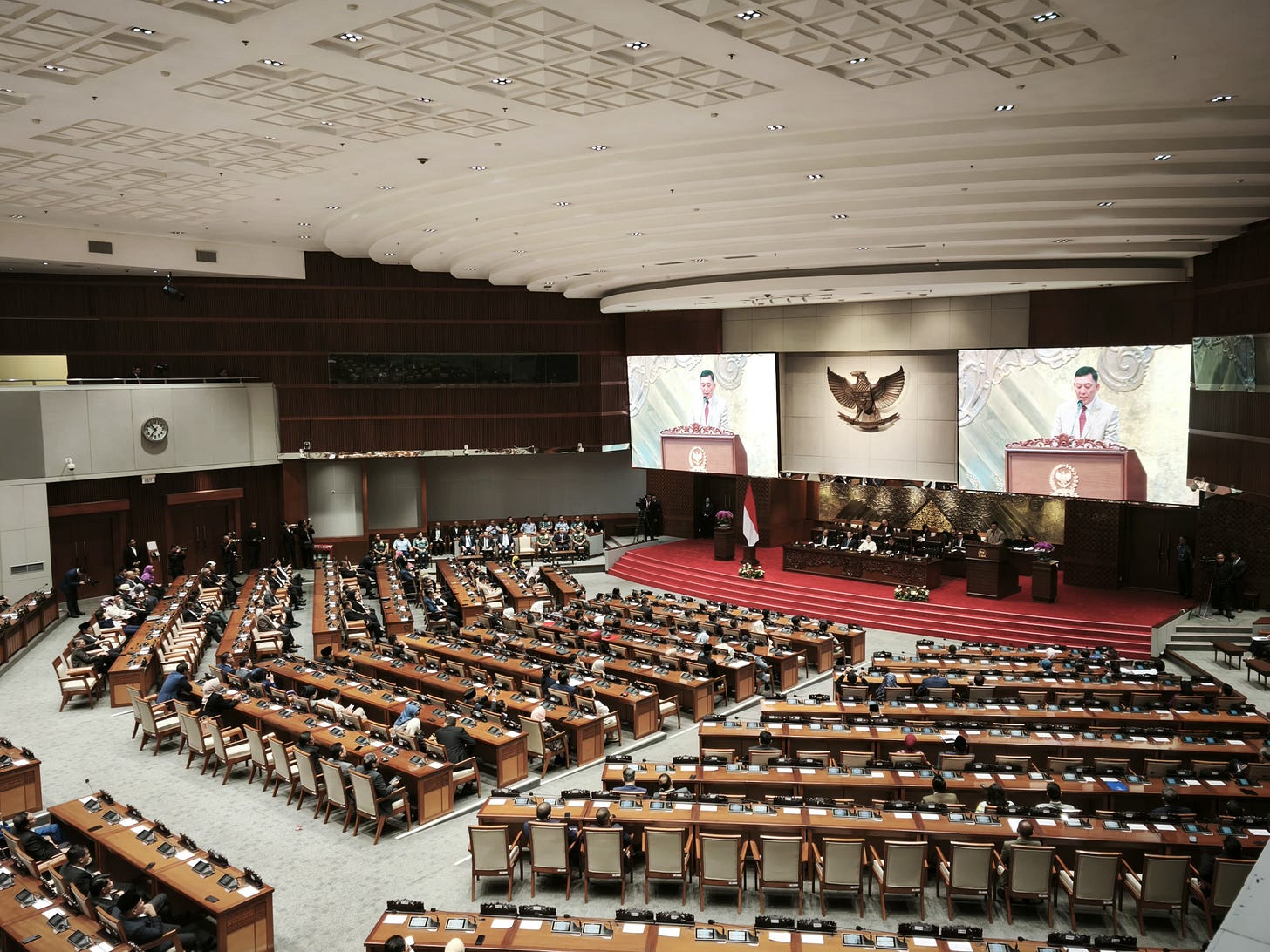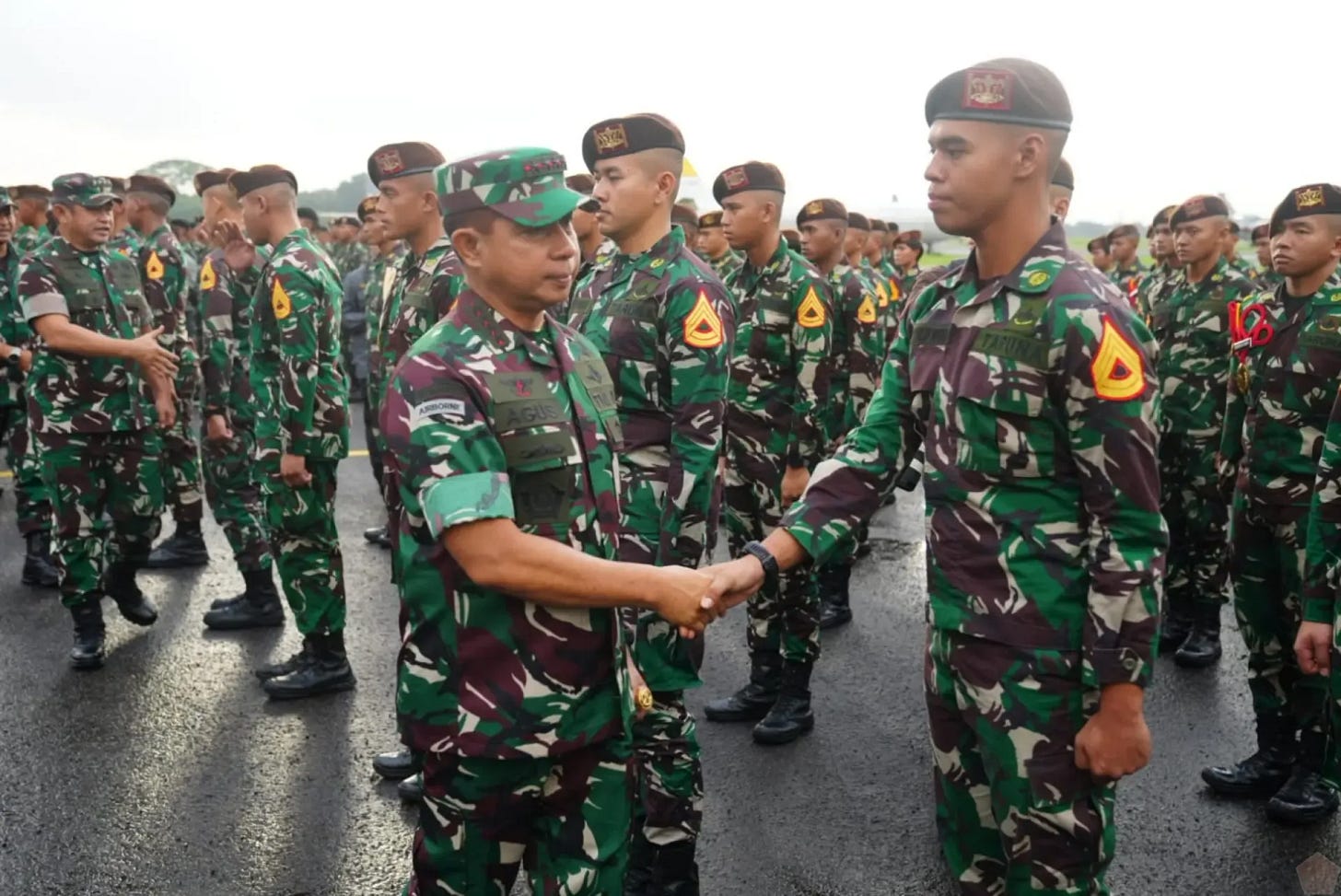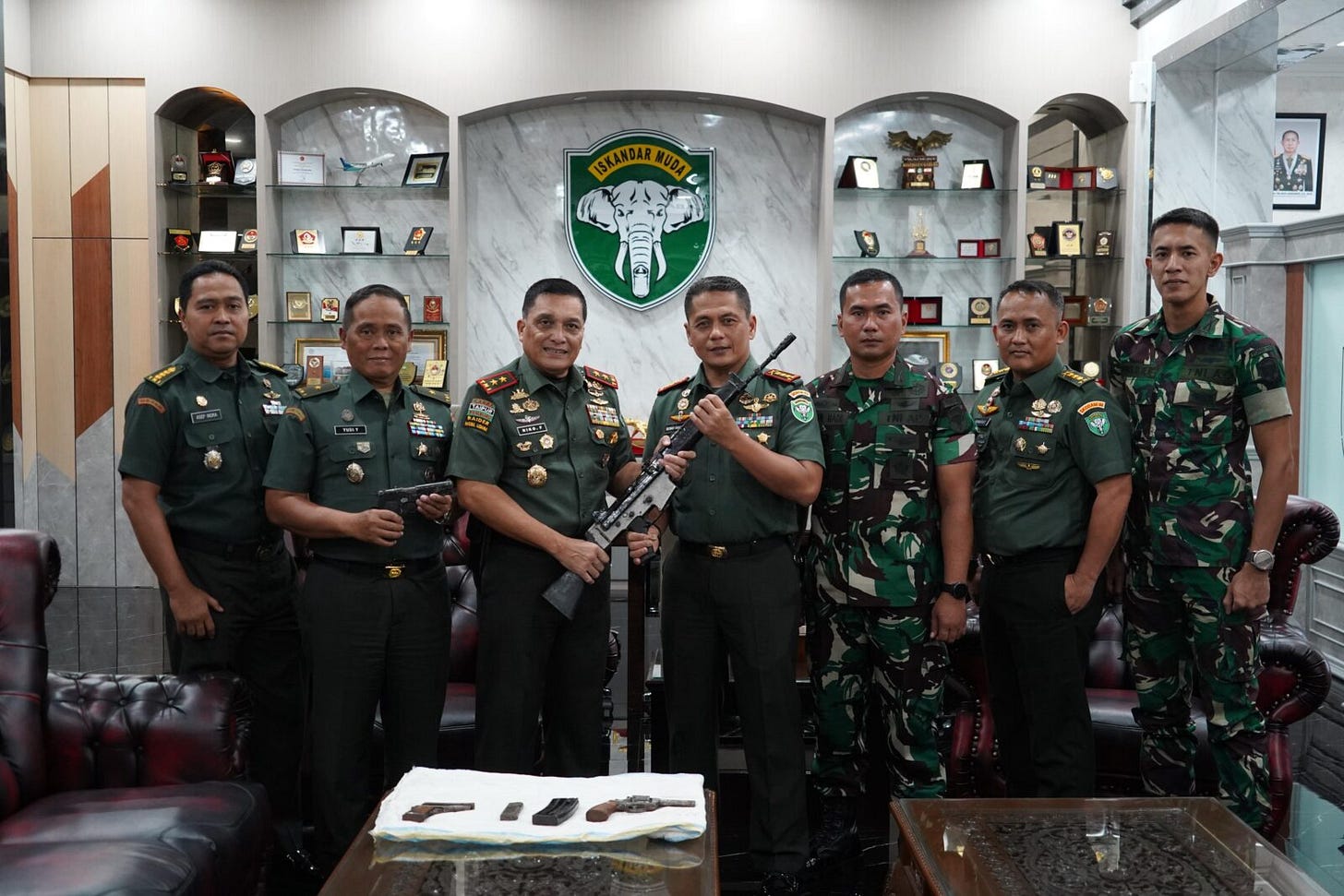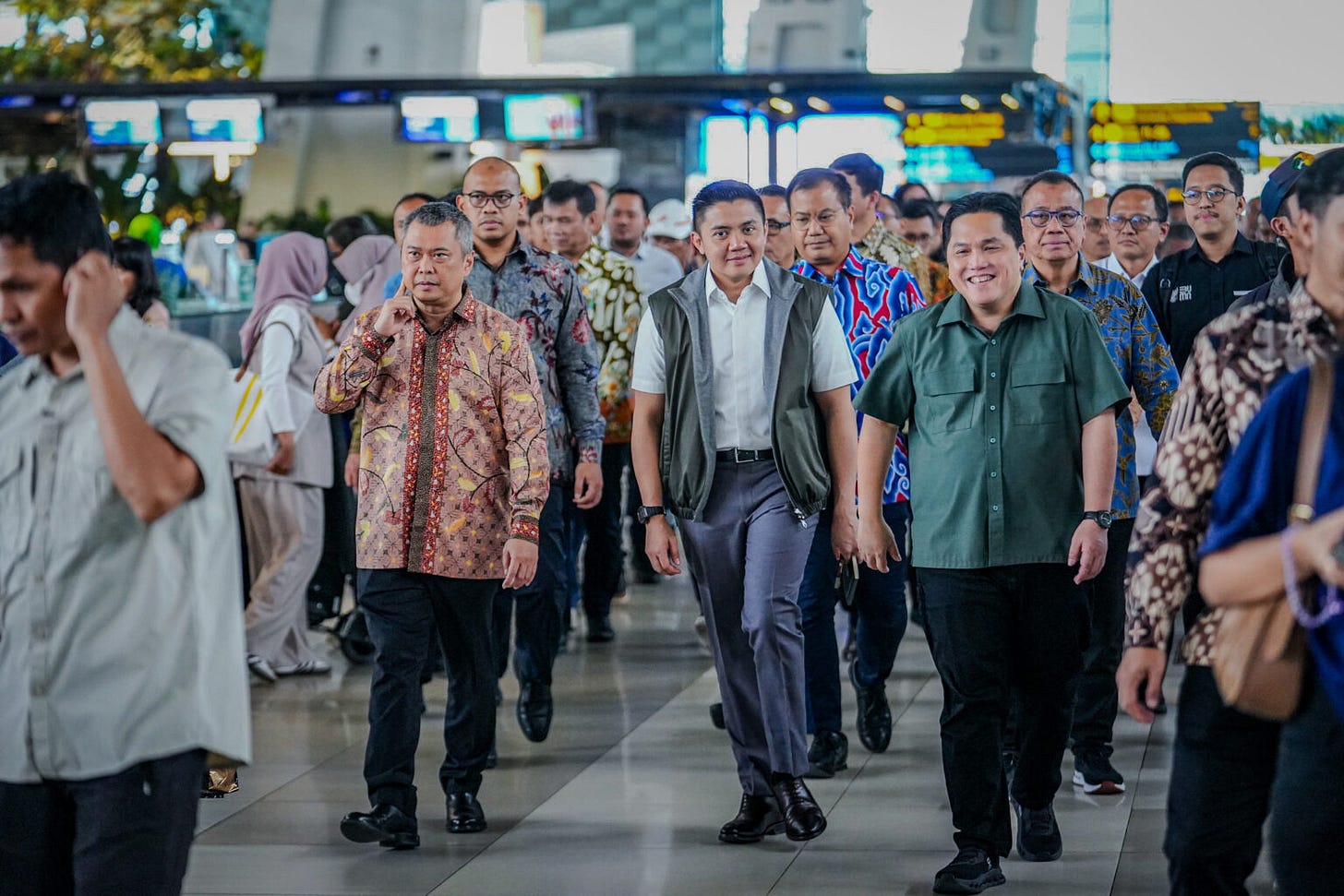Back to the New(est) Order: All you need to know about Indonesia's revised Armed Forces Law
Military officers are now allowed to hold civilian posts in the government without resigning from the TNI, bringing back the spectre of the Suharto-era military dual function, or dwifungsi.
Note: It is not a particularly good time to be Indonesian. If you’re an Indo living in Australia or another country, good on you – though I’m quite sure it really is impossible not to feel angry and helpless. If you’re an Aussie or of another nationality, you’re welcome to watch as ignorant, greedy elites tear down our hard-fought freedom and democracy.

The House of Representatives (DPR) has decided to take Indonesia back to the New(est) Order after they passed the amendment to Law Number 34/2004 on the Indonesian Military (TNI) last Thursday, igniting fears of the restoration of the Suharto-era military dual-function (dwifungsi).
The revision expands the military’s reach into civilian posts in the government without prior retirement. It also extends the retirement age, practically allowing officers in civilian roles to serve longer amid raising concerns about how they can be held accountable.
Despite not being listed as a priority bill for 2025-2029, the legislation was rushed by the DPR, triggering protests in multiple cities across the country. A pro-democracy coalition warned that it jeopardised “the principle of civilian supremacy over the military” – a key reform after the fall of Suharto’s 32-years-long dictatorship, known as the New Order, in 1998.
Yet, parliamentarians ignored those warnings as government and military elites gaslighted concerned citizens and netizens who criticised the bill, dismissing them as “kampungan” – a derogatory term implying someone is from a rural, lower-class background – for “spreading provocation”.
However, the amendment has clearly awakened the nation’s collective trauma from the New Order era, when the military’s presence was felt in everyday life. Officers were active in politics and governmental roles while simultaneously carrying out law enforcement duties.
Some of Indonesia’s worst tragedies took place during this period, when military violence was condoned by the state – starting with the 1965 anti-communist purge which is believed to have taken 2 million lives, and ending by the May 1998 riot which claimed nearly 1,900 people and saw pro-democracy activists murdered or disappeared.
As of this article’s publication, the promulgation of the revised law remains unconcluded, leaving the public unable to access the document. However, its details have been widely reported in Indonesian media, some of which I outline below.

What changed, and what are the problems?
Article 7 (2): Non-Combat Military Operations
Before the revision, the TNI could be deployed for 14 different non-combat military operations, including counter-terrorism, search and rescue, and disaster management. Now, it is also tasked with “overcoming threats to cyber defense” and “protecting and rescuing Indonesian nationals and the national interests abroad”.
The explanation section of the revision does not specify what constitutes “threats to cyber defense”, sparking concerns that the military could encroach on freedom of expressions and information in cyberspace.
Why? Because of the newly added Article 7 (4).
It states that non-combat military operations only require the executive’s approval in the form of Government or Presidential Regulation, effectively removing the role of the DPR as regulated in the old version of the law.
This means troops can now be deployed at president’s discretion, not only in cyberspace, but also in handling “the impacts of problems arising from strikes”, such as in industrial conflicts.
DPR Speaker Puan Maharani stated that both the legislature and government “are committed to upholding civilian supremacy, democratic rights, and human rights”.
Meanwhile, DPR’s Commission I Deputy Chief Dave Laksono told Kompas.id that the results of non-combat military operations would still be reported to the DPR.
But here’s the catch: There is no single opposition party in the DPR. Moreover, President Prabowo Subianto – a former army commander – has filled his government with both active and retired military officers
Article 47 (1): Expansion of available civilian posts
Before the revision, the TNI Law allowed military officers to hold civilian positions in 10 ministries and agencies without resigning from their corps. These included the National Search and Rescue Agency, the National Resilience Council, and the Office of the Coordinating Political and Security Minister.
However, the revision’s academic paper argued that there was a pressing necessity to “fulfil government’s need of specific expertise” in some ministries and/or agencies.
As a result, five more executive bodies have been added into the soldiers’ list of possible places of side hustle: The State Secretariat, the National Counterterrorism Agency, the National Disaster Management Agency, the State Prosecutions Office, and the Maritime Security Agency.
A joint statement by the Commission for the Disappeared and Victims of Violence (KontraS), Amnesty International Indonesia, and Indonesia Legal Aid Foundation (YLBHI) warned that this new provision created “legal uncertainty, potentially undermining the military’s ethical accountability and law enforcement role”.
Central to this concern is whether TNI personnel who commits crimes – especially corruption – can be prosecuted in civilian courts.
Under Indonesia’s current legal system, military can only be tried in military court, which the civil society coalition said was lacking transparency.
“If the [DPR] and the government are truly committed to upholding the mandate of reform, […] they should prioritise revising the Military Court Law rather than amending the TNI Law,” the coalition’s statement said.

Article 53: Extension of retirement age
Before the amendment, junior, senior, and flag officers retired at 58, while lower-ranked enlisted personnel concluded their duty at 53.
After the revision, enlisted personnel can serve until 55, while junior and senior officers (up to colonel rank) retire at 58. Meanwhile, flag officers retire at 60 with an additional year for each higher rank.
That means four-star generals retire at 63 – and, as the highest ranking officers, they are eligible for two one-year extensions if requested by the president.
According to the Indonesia Strategic and Defence Studies (ISDS), a Jakarta-based think-tank, the delay of officer retirement could cost the TNI an additional Rp 412 billion (A$ 41 million) annually to keep 6,700 soldiers on the payroll.
Dwi Sasongko, ISDS co-founder, said the military’s financial burden would only swell each year as more and more officers would retire later.
“The TNI should focus more seriously on fixing its human resource management, from recruitment to promotions and finally retirements,” he said.

Another problem: Active officers already in government
One person who has come under intense public scrutiny is Lieutenant Colonel Teddy Indra Wijaya, the Cabinet Secretary.
Previously an aide for President Joko Widodo and Prabowo during his tenure as Defence Minister, Teddy was not only allowed to remain in the military while holding a civilian post, but was also promoted from the rank of major when he started his job at the Cabinet Secretariat.
The 35-year-old, whom netizens jokingly call as the “First Lady” due to his closeness to the president, has benefited from legal changes seemingly tailored to his situation. Just weeks after taking office in late 2024, President Prabowo issued a presidential regulation placing the Cabinet Secretariat under the Military Secretariat at the Presidential Office.
However, concerns have been raised about Teddy’s eligibility to hold both military and civilian roles, especially since the revised TNI Law does not list the Cabinet Secretariat as one of the civilian posts available to active officers.
The Army Chief of Staff, General Maruli Simanjuntak, attempted to put this debate to bed by backing Teddy, saying that the Military Secretariat has been filled by active officers.
But Teddy is not the only one with questionable positions. Other officers are currently holding civilian positions that are not covered by the new TNI Law:
Maj. Gen. Maryono: Inspector General of Transport Ministry
Maj. Gen. Irham Waroihan: Inspector General of Agriculture Ministry
Maj. Gen. Novi Helmy Prasetya: President Director of the State Logistics Agency
Gen. Maruli Simanjuntak: Chief Commissioner of PT Pindad, a state-owned weapon manufacturer
Admiral Muhammad Ali: Chief Commissioner of PT PAL Indonesia, a state-owned ship manufacturer.
What happens now?
Demonstrations have erupted in many cities including Jakarta, Yogyakarta, Solo, Medan, Manado, Makassar, Bandung, Malang, and Surabaya – and they show no sign of dying down.
Amnesty International Indonesia reported in a statement that police had used “excessive force”, including batons, tear gas, water cannons, and physical violence, against protesters.
Meanwhile, journalists have been facing intimidation. Last Wednesday, a day before the revision was passed, a package containing a rotting pig’s head with both ears cut off was delivered to Tempo‘s office. The targeted recipient was Francisca Christy Rosana, who fronted the outlet’s investigative team.
Three days later, a package of six dead rats was thrown over their office fence. The attack took place as the investigative team concluded their weekly edition on the TNI Law.
As of now, the rejection of the TNI Law revision continues to trend on social media with the hashtag #TolakRevisiUUTNI (Reject TNI Law Revision). It has been mentioned more than 42.000 times and garnered 15 billion interactions on X between 11-17 March, according to Drone Emprit, a social media conversation monitoring.
Whether civilian supremacy prevails remains uncertain.








